Related Research Articles
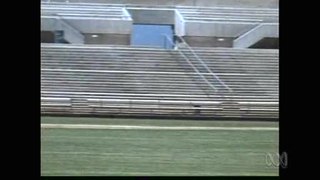
World Series Cricket (WSC) was a commercial professional cricket competition staged between 1977 and 1979 which was organised by Kerry Packer and his Australian television network, Nine Network. WSC ran in commercial competition to established international cricket. World Series Cricket drastically changed the nature of cricket, and its influence continues to be felt today.

The British West Indies (BWI) were colonised British territories in the West Indies: Anguilla, the Cayman Islands, Turks and Caicos Islands, Montserrat, the British Virgin Islands, Antigua and Barbuda, The Bahamas, Barbados, Dominica, Grenada, Jamaica, Saint Kitts and Nevis, Saint Lucia, Saint Vincent and the Grenadines, British Guiana and Trinidad and Tobago. Other territories included Bermuda, and the former British Honduras.
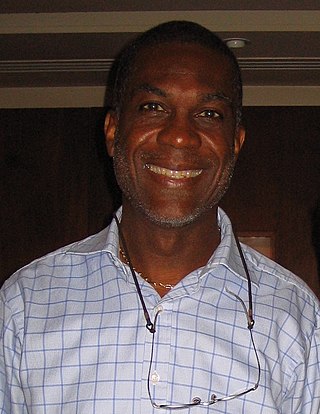
Michael Anthony Holding is a Jamaican former cricketer and commentator who played for the West Indies cricket team. Widely regarded as one of the greatest pace bowlers in cricket history, he was nicknamed "Whispering Death" due to his silent, light-footed run up to the bowling crease. Holding was a key member of the West Indies team that won the 1979 Cricket World Cup, as well as finishing as runners-up at the 1983 Cricket World Cup. He had the most wickets for his team at the 1979 tournament. His bowling action was renowned for being smooth and extremely fast, and he used his height to generate large amounts of bounce and zip off the pitch. He was part of the fearsome West Indian pace bowling battery, together with Andy Roberts, Joel Garner, Colin Croft, Wayne Daniel, Malcolm Marshall and Sylvester Clarke, that devastated opposing batting line-ups throughout the world in the late seventies and early eighties. Early in his Test career, in 1976, Holding broke the record for best bowling figures in a Test match by a West Indies bowler, 14 wickets for 149 runs (14/149). The record still stands. During his first-class cricket career, Holding played for Jamaica, Canterbury, Derbyshire, Lancashire, and Tasmania. In September 2021, Holding announced his retirement from being a commentator.

Learie Nicholas Constantine, Baron Constantine, was a Trinidadian cricketer, lawyer and politician who served as Trinidad and Tobago's High Commissioner to the United Kingdom and became the UK's first black peer. He played 18 Test matches for the West Indies before the Second World War and took the team's first wicket in Test cricket. An advocate against racial discrimination, in later life he was influential in the passing of the 1965 Race Relations Act in Britain. He was knighted in 1962 and made a life peer in 1969.

Sir Everton DeCourcy Weekes, KCMG, GCM, OBE was a cricketer from Barbados. A right-handed batsman, he was known as one of the hardest hitters in world cricket. Weekes holds the record for the most consecutive Test hundreds, with five. Along with Frank Worrell and Clyde Walcott, he formed what was known as "The Three Ws" of the West Indies cricket team. Weekes played in 48 Test matches for the West Indies cricket team from 1948 to 1958. Weekes occasionally donned the wicketkeeping gloves as well. He continued to play first-class cricket until 1964, surpassing 12,000 first-class runs in his final innings. As a coach he was in charge of the Canadian team at the 1979 Cricket World Cup, and he was also a commentator and international match referee.

The Barbados national cricket team is the national cricket team of Barbados, organised by the Barbados Cricket Association (BCA). Barbados is a member of the West Indies Cricket Board (WICB), which is a member of the International Cricket Council (ICC) in its own right, and Barbadians play internationally for the West Indies cricket team.
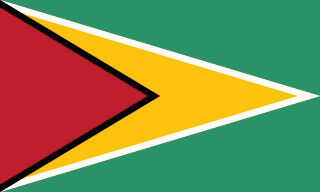
The Guyana national cricket team is the representative first class cricket team of Guyana. The side does not take part in any international competitions, but rather in inter-regional competitions in the Caribbean, such as the Regional Four Day Competition and the Regional Super50), and the best players may be selected for the West Indies team, which plays international cricket. Guyana has participated in the South American Cricket Championship for some editions, but were represented by an overage "masters" team. The team competes under the franchise name Guyana Harpy Eagles.
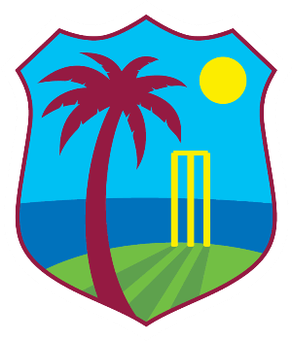
The West Indies men's cricket team, nicknamed The Windies, is a men's cricket team representing the West Indies—a group of mainly English-speaking countries and territories in the Caribbean region—and administered by Cricket West Indies. The players on this composite team are selected from a chain of fifteen Caribbean nation-states and territories. As of 7 June 2024, the West Indies cricket team is ranked eighth in Tests, and tenth in ODIs and fourth in T20Is in the official ICC rankings.
Maurius Pacheco Fernandes, known as Maurice Fernandes, was a West Indian Test cricketer who played first-class cricket for British Guiana between 1922 and 1932. He made two Test appearances for the West Indies, in 1928 and 1930. Fernandes played as a right-handed top-order batsman and occasional wicket-keeper. He scored 2,087 first-class runs in 46 appearances at an average of 28.20.
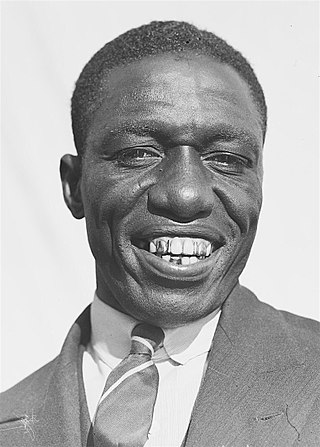
George Nathaniel Francis was a West Indian cricketer who played in West Indies' first Test in their inaugural Test tour of England. He was a fast bowler of renowned pace and was notably successful on West Indies' non-Test playing tour of England in 1923, but he was probably past his peak by the time the West Indies were elevated to Test status. He was born in Trents, St. James, Barbados and died at Black Rock, Saint Michael, also in Barbados.

Wilton H. St Hill was a West Indian international cricketer who played in West Indies' first Test match during their inaugural Test tour of England. A right-handed batman who played in a variety of batting positions, he represented Trinidad in first-class cricket between 1912 and 1930 and played in three Test matches in total. Although his Test record was poor, he was highly regarded in Trinidad. In particular, writer C. L. R. James considered St Hill to be among the top batsmen in the world and dedicated a chapter of Beyond a Boundary to him. At the peak of his career, Lord Harris described him as the best batsman in the West Indies.

Joseph A. Small was a West Indian cricketer who played in West Indies' first Test in their inaugural Test tour of England. He scored the first half century for a West Indies player in Test cricket and played two further Test matches in his career. An all-rounder, he played domestic cricket for Trinidad between 1909 and 1932.
Reginald Osmond Scarlett was a West Indian cricketer who played in three Tests in 1960.

Cricket West Indies (CWI) is the governing body for cricket in the West Indies. It was originally formed in the early 1920s as the West Indies Cricket Board of Control, but changed its name to West Indies Cricket Board (WICB) in 1996. In November 2015, the Board resolved to rename itself as Cricket West Indies as part of a restructuring exercise that would also see the creation of a separate commercial body. This rebranding formally occurred in May 2017.
This article describes the history of West Indies cricket to 1918.

In the sport of cricket, the West Indies is a sporting confederation of fifteen mainly English-speaking Caribbean countries and territories, many of which historically formed the British West Indies. It consists of Anguilla, Antigua and Barbuda, Barbados, the British Virgin Islands, Dominica, Grenada, Guyana, Jamaica, Montserrat, St. Kitts and Nevis, St. Lucia, St. Maarten, St. Vincent & the Grenadines, Trinidad and Tobago and the United States Virgin Islands. The governing body for the confederation is Cricket West Indies (CWI), which is a full member of the International Cricket Council (ICC); beneath the CWI are six territorial governing bodies covering different nations and regions of the confederation. The CWI organises the West Indies cricket team, which represents the confederation in international cricket, as well as administering domestic cricket competitions across the West Indies.
The Stanford Super Series was a series of Twenty20 cricket matches in 2008, sponsored by Allen Stanford. The main game of the Series matched the English national cricket team against an all-star team from the Caribbean, called the Stanford Superstars.

George Alphonso Headley OD, MBE was a West Indian cricketer who played 22 Test matches, mostly before World War II. Considered one of the best batsmen to play for the West Indies and one of the greatest cricketers of all time, Headley also represented Jamaica and played professional club cricket in England. West Indies had a weak cricket team through most of Headley's playing career; as their one world-class player, he carried a heavy responsibility and the side depended on his batting. He batted at number three, scoring 2,190 runs in Tests at an average of 60.83, and 9,921 runs in all first-class matches at an average of 69.86. He was chosen as one of the Wisden Cricketers of the Year in 1934.
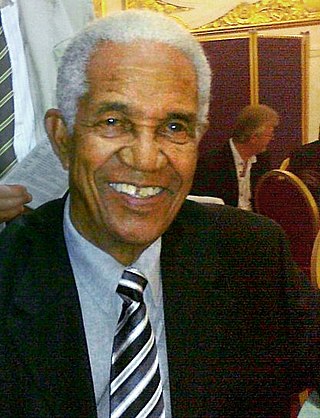
Garfield Sobers, captain of the West Indies cricket team and one of the most prominent cricketers in the world, outraged many in the Caribbean in September 1970 when he took part in a friendly double-wicket tournament at Salisbury Sports Club in Rhodesia, a country in southern Africa that was unrecognised internationally because of its mostly white minority government. The resulting furore nearly caused him to lose the captaincy, and threatened the unity of the West Indies team itself.
In January and February 1983, a representative team of West Indian cricket players undertook a so-called "Rebel tour" to South Africa, to play a series of matches against the South African team. At the time, the International Cricket Council (ICC) had placed a moratorium on international cricket teams making tours of South Africa, due to the nation's government policy of apartheid, leaving South Africa with no official international competition.
References
- ↑ Clover, David (2007). "The West Indian Club Ltd: an early 20th century West Indian interest in London". The Society for Caribbean Studies Annual Conference Papers. 8.
- ↑ F. S. Ashley-Cooper (1899). "At the Sign of the Wicket". Cricket: A Weekly Record of the Game (10 August 1899): 327.
- ↑ St. Pierre, Maurice (1973). "West Indian Cricket — A Socio-Historical Appraisal: PART 1". Caribbean Quarterly. 19 (2): 7–27. doi:10.1080/00086495.1973.11829151. ISSN 0008-6495. JSTOR 23050196.